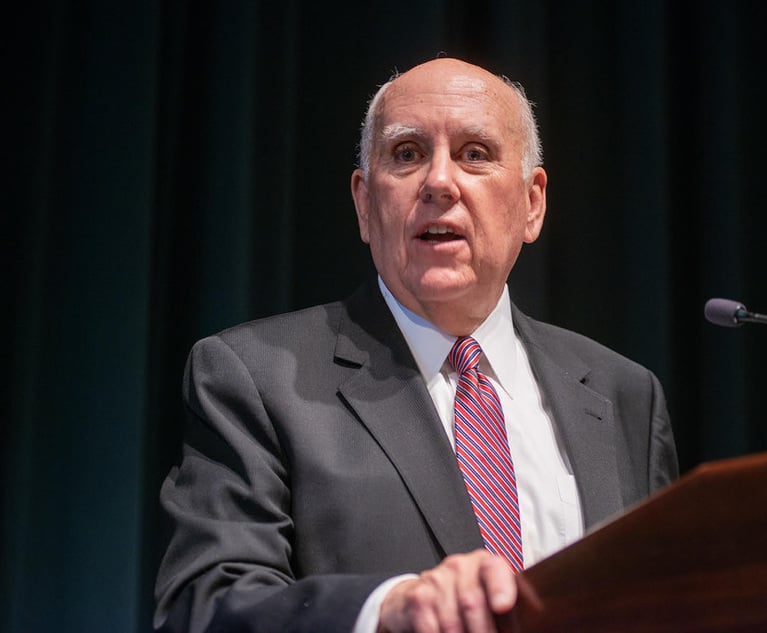 New York State Court Officer Chris Rosino fills out a pass permitting a visitor to be inside the court without a mask at 100 Centre Street in Manhattan on July 14, 2021. Visitors can show their vaccination cards or New York Excelsior pass at the information desk to receive a pass allowing them to opt out of wearing a mask inside. The pass is valid for 90 days. Photo: Ryland West/ALM
New York State Court Officer Chris Rosino fills out a pass permitting a visitor to be inside the court without a mask at 100 Centre Street in Manhattan on July 14, 2021. Visitors can show their vaccination cards or New York Excelsior pass at the information desk to receive a pass allowing them to opt out of wearing a mask inside. The pass is valid for 90 days. Photo: Ryland West/ALM Trying Cases During Trying Times: Recommendations for the Bench and Bar
Many safeguards worked well but some did not, and it is now worth rethinking what is strictly necessary from a safety perspective versus what modifications can be made to help counsel try their case in a manner that is as close to "normal" as current circumstances allow.
August 26, 2021 at 10:00 AM
9 minute read
With the recent and unfortunate surge of the delta variant, it's clear that judges and lawyers will need to adapt to new ways of trying cases for the foreseeable future in order to keep all trial participants safe and healthy. However, it is also important to continue to refine these procedures so as to minimize the challenges inherent in trying cases during these unprecedented times.
This content has been archived. It is available through our partners, LexisNexis® and Bloomberg Law.
To view this content, please continue to their sites.
Not a Lexis Subscriber?
Subscribe Now
Not a Bloomberg Law Subscriber?
Subscribe Now
NOT FOR REPRINT
© 2024 ALM Global, LLC, All Rights Reserved. Request academic re-use from www.copyright.com. All other uses, submit a request to [email protected]. For more information visit Asset & Logo Licensing.
You Might Like
View All
For Safer Traffic Stops, Replace Paper Documents With ‘Contactless’ Tech
4 minute read
Benjamin West and John Singleton Copley: American Painters in London
8 minute readTrending Stories
- 1Vinson & Elkins: Traditional Energy Practice Meets Energy Transition
- 2After 2024's Regulatory Tsunami, Financial Services Firms Hope Storm Clouds Break
- 3Trailblazing Pennsylvania Judge Sylvia Rambo Dies at 88
- 4Alston & Bird Matches Market Rate for Associate Bonuses
- 5Commentary: Freedom's Just Another Word
Who Got The Work
Michael G. Bongiorno, Andrew Scott Dulberg and Elizabeth E. Driscoll from Wilmer Cutler Pickering Hale and Dorr have stepped in to represent Symbotic Inc., an A.I.-enabled technology platform that focuses on increasing supply chain efficiency, and other defendants in a pending shareholder derivative lawsuit. The case, filed Oct. 2 in Massachusetts District Court by the Brown Law Firm on behalf of Stephen Austen, accuses certain officers and directors of misleading investors in regard to Symbotic's potential for margin growth by failing to disclose that the company was not equipped to timely deploy its systems or manage expenses through project delays. The case, assigned to U.S. District Judge Nathaniel M. Gorton, is 1:24-cv-12522, Austen v. Cohen et al.
Who Got The Work
Edmund Polubinski and Marie Killmond of Davis Polk & Wardwell have entered appearances for data platform software development company MongoDB and other defendants in a pending shareholder derivative lawsuit. The action, filed Oct. 7 in New York Southern District Court by the Brown Law Firm, accuses the company's directors and/or officers of falsely expressing confidence in the company’s restructuring of its sales incentive plan and downplaying the severity of decreases in its upfront commitments. The case is 1:24-cv-07594, Roy v. Ittycheria et al.
Who Got The Work
Amy O. Bruchs and Kurt F. Ellison of Michael Best & Friedrich have entered appearances for Epic Systems Corp. in a pending employment discrimination lawsuit. The suit was filed Sept. 7 in Wisconsin Western District Court by Levine Eisberner LLC and Siri & Glimstad on behalf of a project manager who claims that he was wrongfully terminated after applying for a religious exemption to the defendant's COVID-19 vaccine mandate. The case, assigned to U.S. Magistrate Judge Anita Marie Boor, is 3:24-cv-00630, Secker, Nathan v. Epic Systems Corporation.
Who Got The Work
David X. Sullivan, Thomas J. Finn and Gregory A. Hall from McCarter & English have entered appearances for Sunrun Installation Services in a pending civil rights lawsuit. The complaint was filed Sept. 4 in Connecticut District Court by attorney Robert M. Berke on behalf of former employee George Edward Steins, who was arrested and charged with employing an unregistered home improvement salesperson. The complaint alleges that had Sunrun informed the Connecticut Department of Consumer Protection that the plaintiff's employment had ended in 2017 and that he no longer held Sunrun's home improvement contractor license, he would not have been hit with charges, which were dismissed in May 2024. The case, assigned to U.S. District Judge Jeffrey A. Meyer, is 3:24-cv-01423, Steins v. Sunrun, Inc. et al.
Who Got The Work
Greenberg Traurig shareholder Joshua L. Raskin has entered an appearance for boohoo.com UK Ltd. in a pending patent infringement lawsuit. The suit, filed Sept. 3 in Texas Eastern District Court by Rozier Hardt McDonough on behalf of Alto Dynamics, asserts five patents related to an online shopping platform. The case, assigned to U.S. District Judge Rodney Gilstrap, is 2:24-cv-00719, Alto Dynamics, LLC v. boohoo.com UK Limited.
Featured Firms
Law Offices of Gary Martin Hays & Associates, P.C.
(470) 294-1674
Law Offices of Mark E. Salomone
(857) 444-6468
Smith & Hassler
(713) 739-1250








